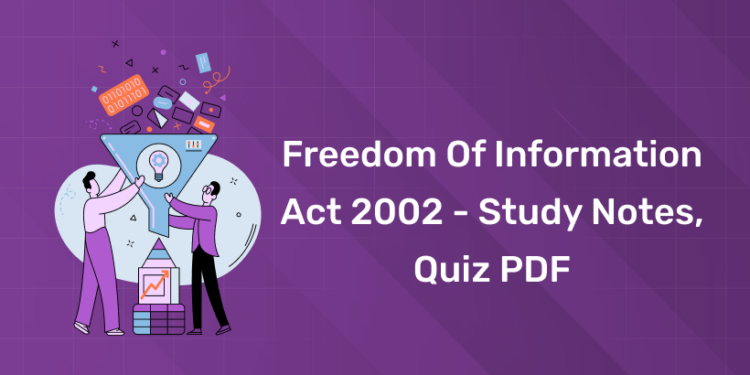Table of Contents
Freedom of Information Act, 2002 is an Act to provide for freedom to every citizen to secure access to information under the control of public authorities, consistent with public interest, in order to promote openness, transparency and accountability in administration and in relation to matters connected there with or incidental there to. Freedom of information is the right to obtain information from any public authority by means of (i) inspection, taking of extracts and notes ; (ii) certified copies of any records of such public authority; (iii) disketts, floppies or in any other electronic mode or through printouts where such information is stored in a computer or in any other device.
Information in this context means any material in any form relating to the administration, operations or decisions of a public authority. The Act provides for making information held by executive agencies of the State available to the public unless it comes within any one of the specific categories of matters exempt from public disclosure . Virtually all agencies of the executive branch of the government are required by the Act to issue regulations to implement the provisions of the Act.
These regulations inform the public where certain types of information may be readily obtained, how other information may be obtained on request and what internal agency appeals are available if a member of the public is refused the requested information. The freedom of information Act is designed to prevent abuse of discretionary power of the Governmental agencies by requiring them to make public certain information about their working and work product.
What are the principles behind the Freedom of Information Act?
The main principle behind freedom of information legislation is that people have a right to know about the activities of public authorities, unless there is a good reason for them not to. This is sometimes described as a presumption or assumption in favour of disclosure. The Act is also sometimes described as purpose and applicant blind.
This means that:
- everybody has a right to access official information. Disclosure of information should be the default – in other words, information should be kept private only when there is a good reason and it is permitted by the Act;
- an applicant (requester) does not need to give you a reason for wanting the information. On the contrary, you must justify refusing them information;
- you must treat all requests for information equally, except under some circumstances relating to vexatious requests and personal data (see When can we refuse a request? for details on these). The information someone can get under the Act should not be affected by who they are. You should treat all requesters equally, whether they are journalists, local residents, public authority employees, or foreign researchers; and
- because you should treat all requesters equally, you should only disclose information under the Act if you would disclose it to anyone else who asked. In other words, you should consider any information you release under the Act as if it were being released to the world at large.
This does not prevent you voluntarily giving information to certain people outside the provisions of the Act.
Features of Freedom of Information act 2002
The Freedom of Information Act (FOIA) 2002 in India is designed to promote transparency and accountability in the functioning of public authorities. Here are the key features of the Freedom of Information Act 2002:
- Right to Information: Citizens have the right to access information held by public authorities. This includes inspecting works, documents, and records, and obtaining information in the form of copies, diskettes, floppies, tapes, video cassettes, or in any other electronic mode.
- Public Authorities: The Act applies to all public authorities, including government bodies, institutions of self-government, and organizations substantially financed by the government.
- Request for Information: Citizens can submit a written request to the public information officer (PIO) of the respective public authority. The request must be accompanied by a nominal fee.
- Timeframe for Response: The PIO must respond to the information request within 30 days. If the information concerns the life or liberty of a person, the response time is reduced to 48 hours.
- Exemptions: Certain categories of information are exempt from disclosure. These include information that would affect national security, foreign relations, public safety, privacy, and other sensitive areas.
- Third-Party Information: If the information sought concerns a third party, the PIO must make a reasonable effort to inform the third party and take their views into consideration.
- Appeals and Grievances: If the information request is denied, or the requester is not satisfied with the response, they can file an appeal. The first appeal lies with an officer senior to the PIO in the concerned public authority. A second appeal can be made to the Information Commission.
- Information Commission: The Act establishes Central and State Information Commissions as independent bodies to oversee the implementation of the Act. They have the power to investigate complaints, conduct inquiries, and impose penalties on PIOs for non-compliance.
- Penalties: PIOs can face penalties for refusing to receive an application, failing to provide information within the specified time, or providing incorrect, incomplete, or misleading information. The penalties include fines and disciplinary actions.
- Proactive Disclosure: Public authorities are required to publish certain categories of information suo motu at regular intervals. This includes details about their organization, functions, duties, records, and any other relevant information.
- Protection for Whistleblowers: The Act provides some protection for individuals who disclose information in good faith regarding misconduct or corruption within public authorities.
- Record Management: Public authorities must maintain their records duly cataloged and indexed for easy access and dissemination.
The Freedom of Information Act 2002 was eventually replaced by the Right to Information (RTI) Act 2005, which expanded and strengthened the provisions for transparency and accountability. The RTI Act 2005 continues to be a crucial tool for promoting transparency and accountability in India.
Freedom of Information Act 2002 Quiz PDF
1: Who was the first woman President of India?
Free UPSKILLING Courses!
Take your first step toward mastering in-demand skills, acing interviews, and securing top-tier jobs with Entri's free upskilling courses.
Start Learning!Freedom of Information Act 2002 Quiz
- What is the primary objective of the Freedom of Information Act 2002?
- a) To restrict public access to government information
- b) To promote transparency and accountability in government operations
- c) To protect personal privacy
- d) To enhance the efficiency of government departments
Answer: b) To promote transparency and accountability in government operations
- Which of the following entities are covered under the Freedom of Information Act 2002?
- a) Private companies
- b) Non-governmental organizations (NGOs)
- c) Government bodies and public authorities
- d) International organizations
Answer: c) Government bodies and public authorities
- Under the Freedom of Information Act 2002, within how many days must public authorities respond to a request for information?
- a) 10 days
- b) 30 days
- c) 45 days
- d) 60 days
Answer: b) 30 days
- Which section of the Freedom of Information Act 2002 deals with the exemption of certain types of information from disclosure?
- a) Section 8
- b) Section 10
- c) Section 18
- d) Section 22
Answer: d) Section 22
- Who can file a request for information under the Freedom of Information Act 2002?
- a) Only Indian citizens
- b) Any individual or organization
- c) Government officials
- d) Only registered NGOs
Answer: a) Only Indian citizens
- What is the fee for filing an application under the Freedom of Information Act 2002?
- a) No fee
- b) Nominal fee as prescribed by the government
- c) Rs. 50
- d) Rs. 100
Answer: b) Nominal fee as prescribed by the government
- Which body is responsible for overseeing the implementation of the Freedom of Information Act 2002?
- a) Central Information Commission
- b) Supreme Court of India
- c) National Human Rights Commission
- d) Ministry of Home Affairs
Answer: a) Central Information Commission
- Which of the following is not an exempted category under the Freedom of Information Act 2002?
- a) Information related to national security
- b) Information affecting sovereignty and integrity of India
- c) Personal information unrelated to public activity
- d) Information about government contracts and tenders
Answer: d) Information about government contracts and tenders
- What recourse is available if a request for information is denied under the Freedom of Information Act 2002?
- a) Appeal to the Central Information Commission
- b) File a complaint with the police
- c) Take legal action in a civil court
- d) Report to the Prime Minister’s Office
Answer: a) Appeal to the Central Information Commission
- Can information about third parties be disclosed under the Freedom of Information Act 2002?
- a) Yes, without any conditions
- b) No, never
- c) Yes, with third-party consent or if public interest outweighs privacy concerns
- d) Only if the third party is a government employee
Answer: c) Yes, with third-party consent or if public interest outweighs privacy concerns














